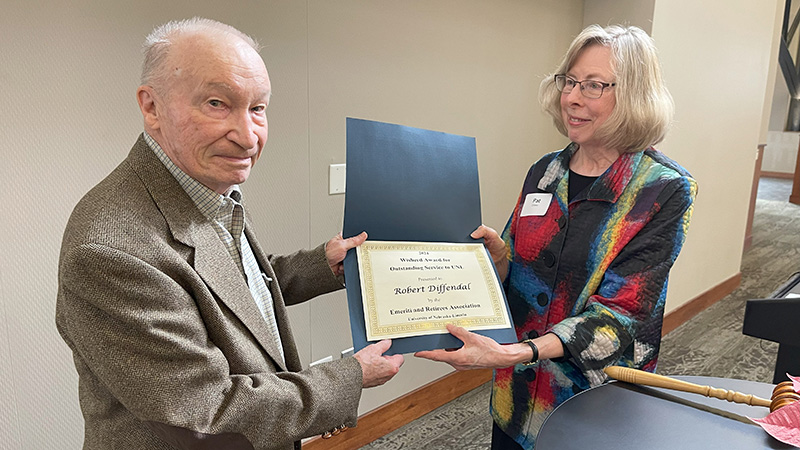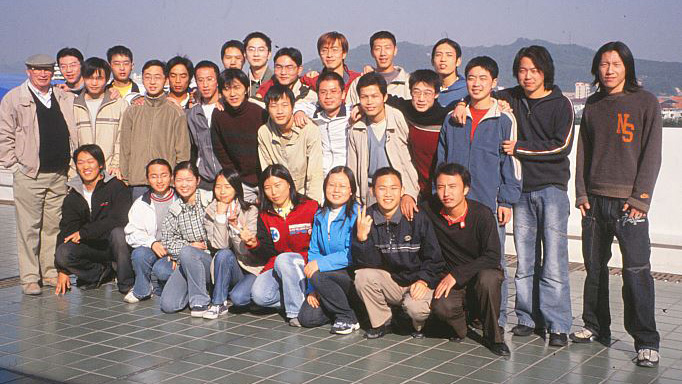Posted: 12/13/2024
Diffendal receives Wisherd award for university service

By Ronica Stromberg
Ever since retiring, Robert Diffendal seems to be working everywhere.
The professor emeritus of the School of Natural Resources retains offices in three buildings. He reports to work at the Center for Great Plains Studies five days a week for about four hours a day. His list of volunteer activities around the state goes on and on, affecting, by his count, 21,088 people since he retired in 2003. He topped this year’s activities off on December 12 at Nebraska Innovation Campus, where he received the Wisherd Award for Outstanding Service to the University of Nebraska-Lincoln.
Chosen by the Emeriti and Retirees Association, the award recipient gets $500 donated in their honor to the ERA Scholarship Fund, which goes to a University of Nebraska-Lincoln sophomore or junior based on need. The association chooses each year’s Wisherd recipient from almost 600 members for their volunteer service. Of course, with the vast reach of his service, Diffendal may have had a leg up on the competition.
"I'm everywhere," the 84-year-old said.
Since quitting work (wink, wink), he has traveled the state to give talks on fossils, minerals and rocks. He has led field trips, edited other professors' articles and books, published maps and reports, served on graduate and other university committees, taught courses at the Osher Lifelong Learning Institute, attended national meetings of geological societies, traveled to archeological and geological sites around the world, served as a volunteer curator of the invertebrate paleontology collections of the University of Nebraska State Museum and taught grade schoolers at the SCORE Science Camp in Imperial, Nebraska.
He used to do geology research and mapping for the Conservation and Survey Division of the School of Natural Resources. In the days before global positioning systems, he mapped the geology of many parts of western and north-central Nebraska using a hand level, compass and paper maps.
"What I did was to go out summer after summer and spend weeks at a time getting permissions and walking over private property and drawing lines on the topographic map to match up with drill hole data from where the rocks are not exposed," he said.
The accuracy of his work was confirmed for him in 2019 when a geologist from the Kansas Geological Survey asked him to take him to the sites where he found deposits of volcanic ash. The man had taken the geologic maps Diffendal had made on a scale of one inch to 24,000 inches and had input them into his computer and added GPS.
"We went to 25 sites and drove offroad up to these places where I found the ash, and every place on the map where I said the ash was, we drove to, and it was there,” he said. “It was within 10 feet, plus or minus altitude wise, and spot-on on the exact position, which . . . I didn't believe it!"
That was a proud recent moment for Diffendal, seeing how he had accomplished the seemingly impossible years ago with a hand level, compass and paper maps.
He said he was also proud of the impact that his past and present work has had, and continues to have, on people.
"I'm still talking to people out in western Nebraska who I first met back in the late 1960s,” he said. "I still have rancher friends out west that we still email correspond, so there had to be something that I did."
He noted receiving thanks recently from a woman he had taught at a science camp in Imperial, Nebraska, in 1989. He said the woman came up to him at a recent science camp and told him she became a geologist because of the interesting things he had taught her at that camp years ago. She also said she had her daughter enrolled in the current camp.
He remains in contact with geosciences students he taught at Sun Yat-Sen University in Guangzhou, China, and others he influenced in 11 trips he took to that country. He also still receives Christmas cards and emails from his students at Nebraska, he said.

Diffendal included such personal impact as an important part of what he wants to be known for in his legacy.
"If people are still reading my stuff long after I'm deceased, that would be a good thing. And if it turns out that what I had to say is something that helps them, that's even better," he said.
His 182 publications remain available at the university’s digital commons (https://digitalcommons.unl.edu/diffendal/) and draw thousands of downloads from around the world each year.
The award he received is one of three Wisherd awards, the other two being the Wisherd Award for Outstanding Community Service and the Wisherd Award for Outstanding National/International Humanitarian Service. Patricia Crews, co-chair of the awards committee, said the other two Wisherd awards were not awarded in 2024.
She said few individuals match Diffendal’s record of service and the number of people and years he served made him outstanding. She noted also that he had more than one nominator.
"I’m very happy to get the award," Diffendal said. "You never know whether what people say will have an impact on a committee that's evaluated."